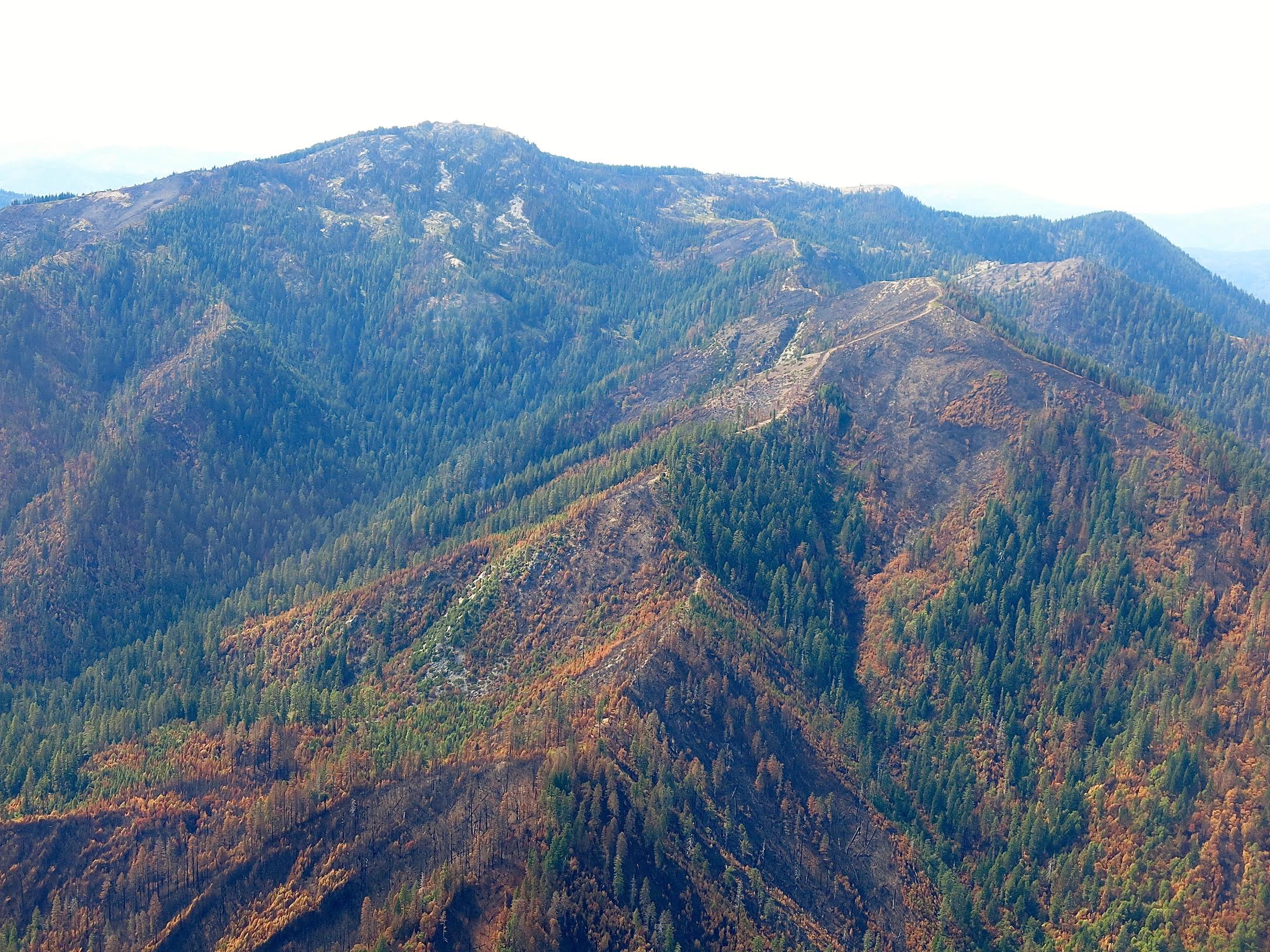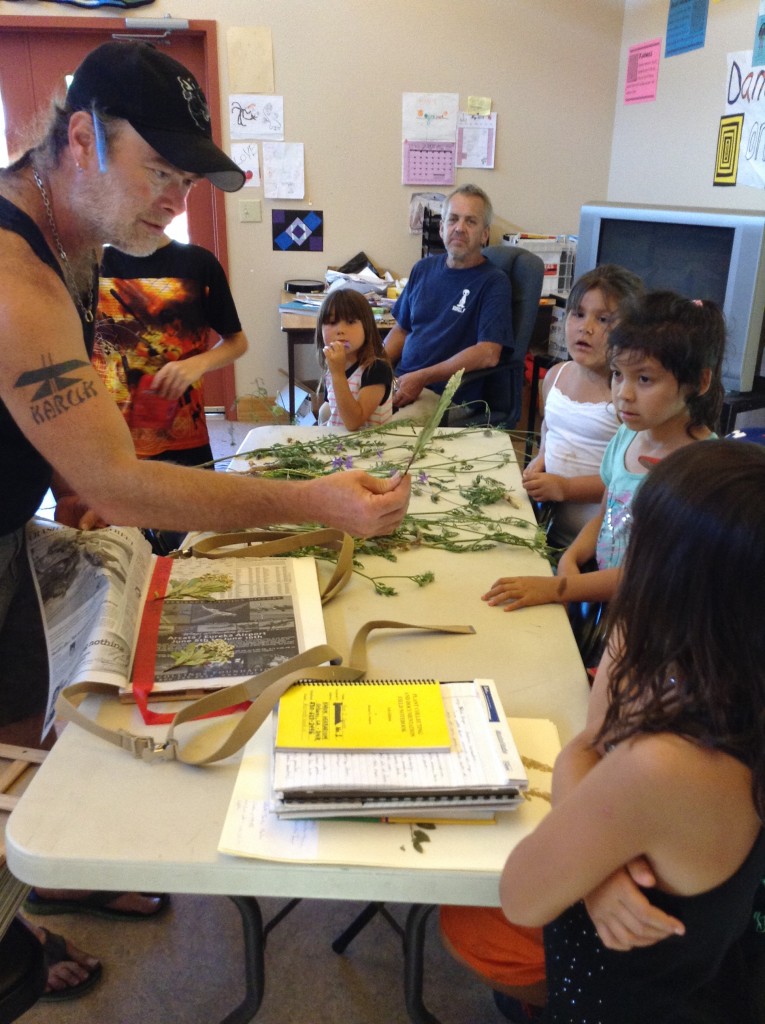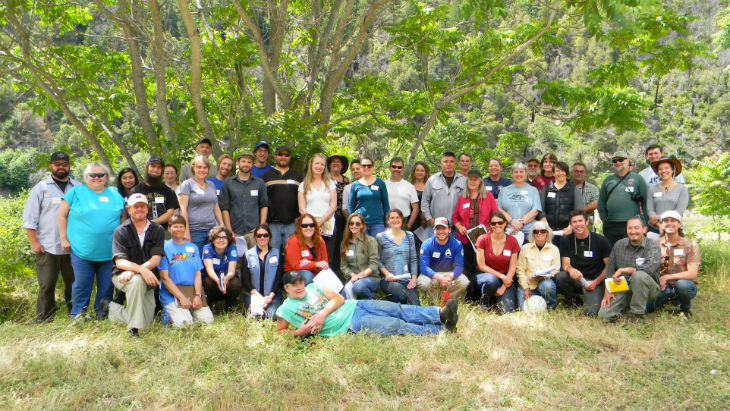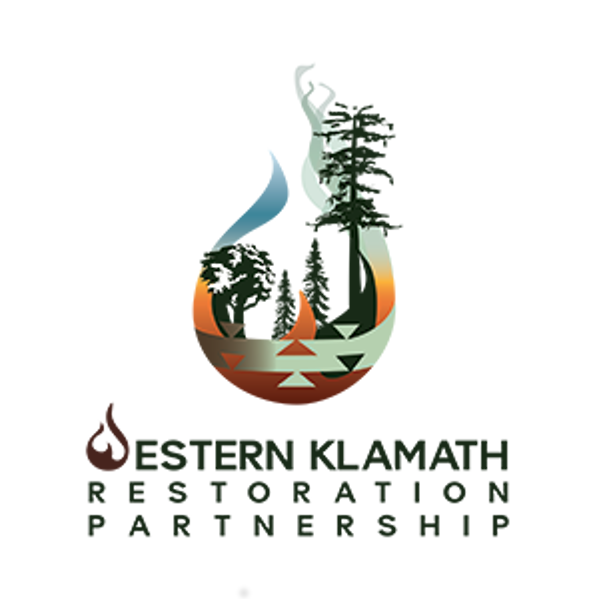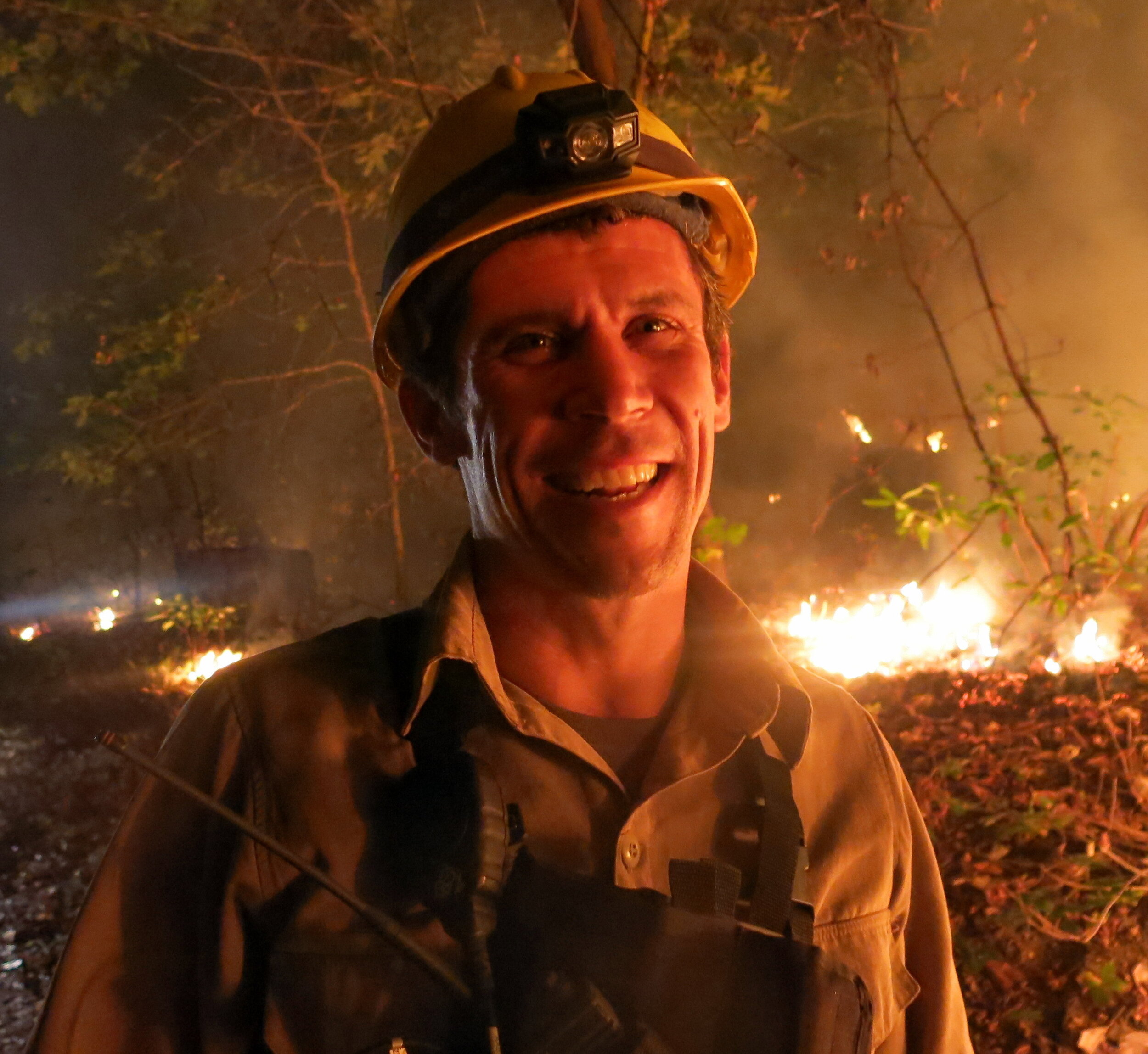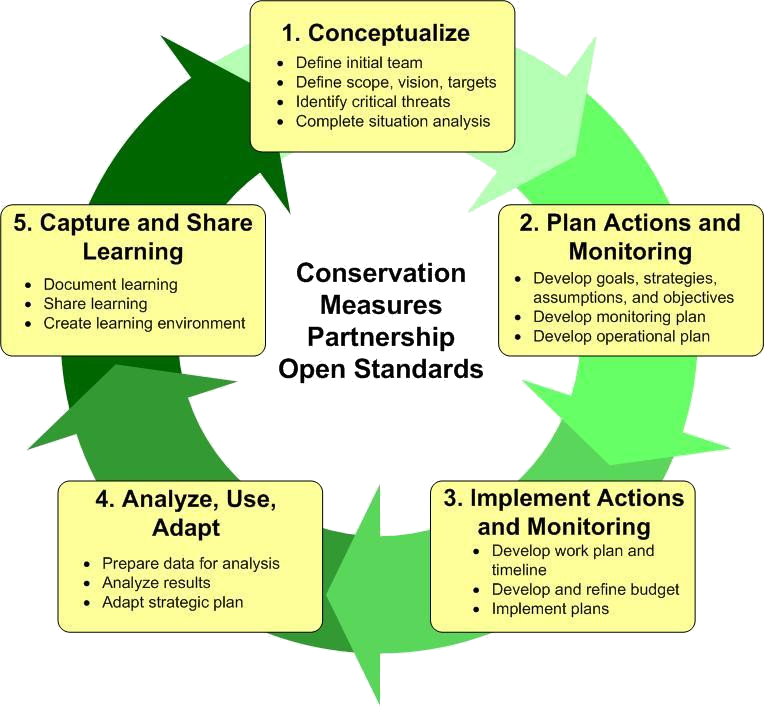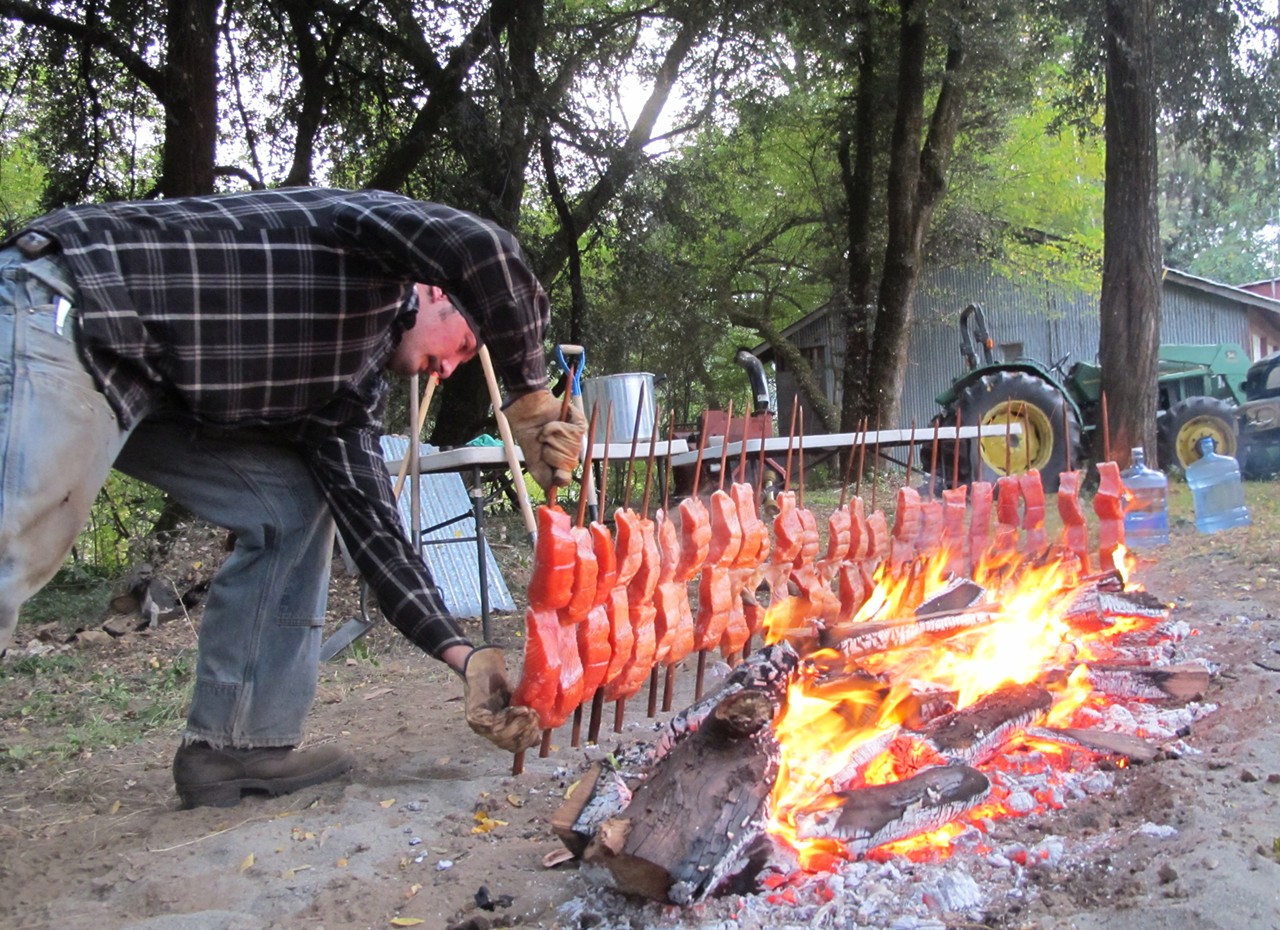
Partnership Structure
WKRP has four nominated Co-leads. In addition to the Co-leads, the day-to-day operations of the partnership are governed by the WKRP Core Team, made up of representatives of additional partner groups. Day-to-day operations of WKRP are managed by a full-time Partnership Coordinator. Additional work is accomplished through “working groups” based on functional areas, and geographically based “subgroups”.
Bill Tripp, WKRP Co-lead. Bill is a Karuk tribal member, and Director of Natural Resources and Environmental Policy at the Karuk Tribe Dept. of Natural Resources. He serves as Co-Chair of the Western Region Strategy Committee, and is an advisor to the Indigenous Peoples Burning Network. Bill has been a student of fire from an early age; by the time he was 8, after learning from his grandmother from age 4, he was burning by himself, tending to hazel, beating back blackberry, and keeping the ground under black oak trees clear of excessive leaf litter and dead wood. Throughout his career, Bill has worked to integrate indigenous and western science into collaborative land management frameworks with an eye towards meeting the needs of water, fish, wildlife, plants, and people. Bill believes that viewing active management through the lens of socioecological resilience first, is key to progressing shared values of a diverse array of knowledge, practice and belief systems in our mission of learning to live with wildland fire in a changing climate.
Will Harling, Mid Klamath Watershed Council (MKWC), WKRP Co-lead. Will is the Director and co-founder of MKWC (est. 2001) and is a strong proponent of increasing the use of prescribed fire to create fire resilient forests and communities in the Western Klamath Mountains of northern California and beyond. He received a B.S. in Environmental Biology with a focus on fisheries from Humboldt State University. Prior to that he worked for the USFS and other governmental and non-governmental agencies since 1993 in the field of natural resources. He’s managed dozens of fisheries and watershed restoration projects locally and has a close working relationship with local, state, tribal and federal agencies, as well as residents throughout the Middle Klamath Subbasin. Will's also a storyteller, community organizer, fire worker, desk jockey, fisherman, and father of two beautiful wild mountain kids.
Karuna Greenberg, Salmon River Restoration Council (SRRC), WKRP Co-lead. Karuna is the Director of SRRC where she oversees the organization’s program work. She serves as the lead liaison for the Salmon River Community Liaison Program, and as the Resource Director for the Salmon River Fire Safe Council. She has a B.S. degree from Evergreen State College and a M.S. in Environmental Planning from UC Berkeley. Growing up on the Salmon River in the rugged Klamath Mountains has strongly influence her interest in the human-fire connection.
Clint Isbell, Klamath Nation Forest (KNF), WKRP Co-lead. Clint has a background in ecology and at KNF conducts science-based analysis and research, forest-level management, and fire/fuels and ecological modeling and monitoring. He has an advanced degree in natural resources with an emphasis in fire ecology, restoration ecology, and wildland fire and fuels management. Over the past 15 years, Clint's developed a strong operations background in prescribed fire, and wildland fire and fuels management. In his current position, he’s developed long-lasting partnerships at multiple levels within the agency as well as with private entities, stakeholders, local and state organizations, and academia. With WKRP, he brings experience of Klamath Mountain ecosystems and strong communication and interpersonal relationship skills to the the team.
Frank K. Lake PhD, USFS-PSW Research Scientist, lead coordinating scientist for WKRP, and Core Team Member. Frank received a BS from the University of California-Davis (1995) in Integrated Ecology and Culture with a minor in Native American Studies. In 2007 he completed his PhD from the Oregon State University Env. Sci. Program. Currently at the PSW Fire and Fuels Program, he works on tribal and community forestry and related natural resource issues. His research focuses on restoration ecology and the incorporation of Indigenous knowledge into landscape restoration strategies, and wildland fire and forest management in the Pacific Northwest and northern California, with an emphasis on the Klamath-Siskiyou bioregion. More recently, he’s focused on working with tribes and how indigenous knowledge can be incorporated into scientific climate change research to support tribal vulnerability, adaptation and mitigation planning. Frank has co-authored many articles, book chapters, webinar, and other science products co-developed with diverse collaborators. He is a fireline qualified resource advisor and has worked with many partners on wildland fire assignments; and is an advisor to the Indigenous Peoples Burning Network. Frank is of mixed American Indian, Mexican and European ancestry.
Earl Crosby, Karuk Tribe, WKRP Core Team Member. Earl was the Deputy Director of Watersheds Branch with the Karuk Tribe Dept. of Natural Resources for many years. He received a B.S. from Humboldt State University in 1997. His passion for restoration began in 1985 when he joined the California Conservation Corps. With his partners and dedicated staff in the Six Rivers National Forest he planned and implemented road decommissioning projects throughout the southern portion of the Karuk Aboriginal Territory until 2015, when they literally ran out of roads to decommission! He is dedicated to the Karuk Tribe’s inherent right in protecting, promoting, and preserving the cultural/natural resources and ecological processes upon which the Karuk depend.
Luna Latimer, Co-Director of the Mid Klamath Watershed Council, WKRP Core Team Member. Luna has worked at MKWC since 2003 where she did graduate research with the Orleans/Somes Bar Fire Safe Council. She received a Master’s degree in Applied Anthropology from Oregon State University that focused on forest restoration projects on private land in the middle Klamath region. She is a fifth generation forest worker and currently works with private landowners, agencies, contractors and non-profit organizations to restore both upslope and in-stream ecosystems. Luna is passionate about non-timber forest products and also serves as a board adviser for the Northwest Forest Worker Center.
Kimberly Baker, Klamath Forest Alliance (KFA) / Environmental Protection Information Center (EPIC), WKRP Core Team Member. Kimberly has worked to defend wildlife and wild places since 1998, gaining over two decades of knowledge through monitoring and commenting on nearly every timber sale in California’s Pacific Northwest national forests. Starting as a forest watch volunteer for the Klamath Forest Alliance she is now Executive Director for this grassroots conservation organization. Since 2007, Kimberly also works as Public Land Advocate for EPIC, the Environmental Protection Information Center. Awareness of forest history and ecology, community, environmental law, policy and science informs her experience with conservation networks, collaborative partnerships, tribes and agencies. Kimberly served on the Humboldt County Resource Advisory Committee (RAC) for six years and now serves for Del Norte County. She is dedicated to long-term watershed restoration, wildlife recovery and establishing wildlife corridors for a connected northwest California.
Carol Sharp, Happy Camp Fire Safe Council (HC-FSC), WKRP Core Team Member. Carol grew up in Siskiyou County and worked for the USFS for 34 years. She received a BA degree in Psychology from California State University at Sacramento and later studied Forestry at Humboldt State University. Carol started working in silviculture in 1977 and began working as a forester in 1989. She attended the Silviculture Institute and became a Certified Silviculturist in 1998. She spent her entire career at the Happy Camp Ranger District on the Klamath National Forest and has served as the Secretary of the HC-FSC since 2003. She also serves on the Board of Directors for the Mid Klamath Watershed Council.
Jon Grunbaum, HC-FSC, WKRP Core Team Member. Jon studied fisheries science at Humboldt State University, earning a BS degree in 1989, and a MS in Fisheries Science from Oregon State University in 1996. He worked with the Aquatic and Land Interaction Research Group at the Pacific Northwest Research Station to study the effects of forestry and other land-use practices on aquatic habitat and particularly fish species. Jon has been a zone Fishery Biologist on the Klamath National Forest since 1994. In 2001 he worked on the Aquatic-Riparian Effectiveness Monitoring Program – a pilot program evaluating Northwest Forest Plan’s impact on aquatic and riparian ecosystems. His career passion is to develop partnerships to protect and restore instream fisheries habitat as well as upslope landscapes and ecosystems that have been adversely affected by decades of fire exclusion.
Cathy Meinert, Karuk Tribe Elder, WKRP Core Team Member. Cathy has been with WKRP since it began in 2014. She is a Karuk tribal member and resident of the Happy Camp community. Her passion, dedication, contributions, and perspective are an invaluable asset to the partnership.
Analisa Tripp, Collaborative Stewardship Program Manager, WKRP Core Team Member. Analisa is a Karuk woman who was raised on her ancestral homelands in Northern California, where she continues to live and work today. A great deal of her formative years was spent outside, on the land, tending to special places, gathering traditional plants and foods, leaving her with a tremendous amount of love and respect for our natural world. Analisa received a B.A. in Native American Studies from UC Berkeley in 2014, and is currently working on a M.A. in Environment and Community from Humboldt State University. She has been employed by the Karuk Tribe’s Department of Natural Resources since 2015 and has worked in archaeology, natural and cultural resources management, food security, and more during her time there. She currently serves as the Karuk DNR’s Collaborative Stewardship Program Manager.
Colleen Rossier PhD, Karuk Tribe - Píkyav Field Institute Program Manager, WKRP Core Team Member. Colleen is WKRP Core Team’s newest addition. She recently returned (2021) back to the area after earning her PhD from UC Davis where her dissertation focused on demonstrating the importance of integrating Indigenous and Western science, and management systems to enhance socio-ecological resilience. She did this in collaboration with Karuk and Yurok Tribes and Karuk, Yurok, and Hupa people through a case study on Indigenous stewardship / management (including cultural burning) and use of evergreen huckleberry. Her research produced adaptive management recommendations for evergreen huckleberry in WKRP management areas as well as policy recommendations encouraging Indigenous-led and Indigenous-directed research and management. Her new role with the Karuk Tribe Dept. of Natural Resources (KDNR) focuses on the intergenerational learning and food sovereignty aspects of KDNR including research and monitoring collaborations; eco-cultural educational efforts for K-12 youth and internships for high-school and college-age youth; digital archiving; protection of Karuk intellectual property and data sovereignty; and environmental workforce development / vocational training.
Jodie Pixley, Partnership Coordinator, WKRP Core Team Member. Jodie manages daily WKRP operations to progress partnership efforts forward. She holds an MA from Humboldt State University where her research in part focused on WKRP. Her BS, also from HSU, in Environmental Science concentrated on Soils and Watershed Management. Jodie worked in restoration for over 10 years prior to joining WKRP. She is focused on building capacity within the organization by working closely with all partners as well as residents throughout the Mid Klamath Subbasin.
WKRP and the Open Standards Process
This Partnership enables diverse stakeholders to work together through the Open Standards Process for Conservation. This process resulted in Zones of Agreement where all parties agree upslope restoration needs to occur. WKRP was originally focused solely on the Middle Klamath subbasin and was called the Middle Klamath Restoration Partnership, which has been meeting since 2007. The Partnership’s initial focus was on instream fish habitat restoration, as there was significant funding available and a favorable socio-political climate for achieving success. In recognition of the controversial issues surrounding forest management in the region, participants chose to wait to focus on upslope restoration until facilitators capable of bringing the group from conflict to understanding and general conceptual agreement were identified.
Shared Values emerged (through the Open Standards Process) and Six Conservation Targets were identification. We not only consider these in what we do, but aim to achieve improvement of target viability (i.e. Values/Targets below).
WKRP Shared Values
1. Fire Adapted Communities
2. Restored Fire Regimes
3. Healthy River Systems
4. Resilient Bio-diverse Forests/Plants/and Animals
5. Sustainable Local Economies
6. Cultural and Community Vitality
The identification of critical threats to our conservation values were defined based on how real world threats to the viability to our Values/Targets apply to our landscape, these include:
Lack of stable jobs
Erosion of community and cultural values, including Karuk traditional practices
Lack of beneficial fire
Altered forest structure and composition (overly dense forests)*
High fuel loading
Lack of defensible space
Habitat degradation (terrestrial and aquatic)
Impaired fishery
Situation Analysis showing linkages between strategies, threats, and values
WKRP Strategies
WKRP strategies were developed to address critical threats to achieving our conservation targets. These, along with the Shared Values and Approach, were born out of the Open Standards Process facilitated by The Nature Conservancy and the Fire Learning Network. These strategies allow the partnership to directly address threats to and improve areas identified in our Shared Values.
Develop and implement landscape level strategic fuels reduction treatments
Increase use of fire to restore & maintain Pre-European conditions in a contemporary context
Increase local restoration capacity
Create sustainable diverse revenue streams to address all threats and values
Accelerate development of Fire Adapted Communities
Integrate food security into forest management actions
Advocate for and support implementing existing fisheries restoration plans
Develop integrated, inter-generational education programs and activities that complement our identified strategies
Develop inclusive partnerships for implementing zones of agreement (formerly - Improve inter-governmental and community coordination and communication efforts)

Guiding Principles: The Way We Work
The WKRP defined the guiding principles of the group during a series of workshops facilitated by the Fire Learning Network and the Nature Conservancy using the Open Standards Process. These principles will be used to guide partnership actions and measure achievements.
We are results-oriented.
We work toward having beneficial fire operating throughout our landscape.
We incorporate cultural values and traditional ecological knowledge into our work.
Our activities seek to build our local workforce.
We use the Open Standards for the Practice of Conservation as our guide to adaptive management and collaboration.
Our Approach
Develop community based Incident Management Teams to implement prescribed fire/cultural fire training exchange programs and for wildfire response.
Accelerate the development of fire adapted communities.
Integrate food security, food sovereignty, and forest food and fiber resources into management actions.
Increase capacity of diverse groups of fire practitioners to address policies and regulations that impede the large scale use of prescribed fire/cultural fire.
Build capacity for practitioner based research and monitoring programs to create and maintain adaptive management feedback loops.
